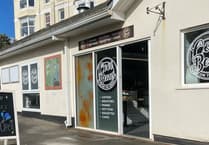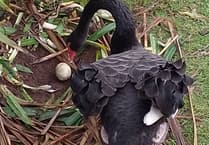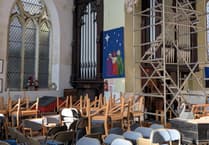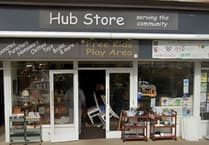IT will be at least 12 months before any new birds can be introduced to the Dawlish aviary.
Following the mass cull of between 40 and 50 wildfowl due to an outbreak of Avian Flu, it has been confirmed that DEFRA will only allow new birds into the town’s aviary for a year.
But a fundraiser has almost reached its £2,000 target towards supporting the town council carry out a deep clean of the aviary and eventually some new birds when it is safe to do so.
Organiser Alfie Binyon said: ‘Thank you so much for nearly reaching the target so early we plan on meeting with the council in the next few weeks to discuss what the next steps are.
‘We are aware that DEFRA will not allow new waterfowl to be introduced for 12 months.
‘Our hope is to put the money towards new swans, but we have also been made aware that part of the aviary has still not been covered.’
Residents have been heartbroken at the loss of the birdlife which is also a popular attraction for visitors.
Six black swans died in a previous outbreak after contracting the disease in November 2020 during the pandemic when one adult and five cygnets died from the virus.
Following this outbreak, Devon County councillor for Dawlish Rosie Dawson said: ‘We have gone through this before and we will again but this is without doubt a heartbreaking blow for Dawlish at an already challenging time.
‘I have every faith in the town council outside services staff to manage this professionally and with sensitivity with the wellbeing of the birds at the heart of the action as always.’
The birds, which included tufted ducks, mandarins and shelducks as well as varieties of geese, had to be humanely culled after Dawlish Town Council was notified last week by the Animal and Plant Agency that several birds in the aviary had tested positive for the highly pathogenic disease.
At least five birds in the aviary had already died as had several of the famous black swans before the tests confirmed it was Avian Flu.
However, birds which are out on Dawlish Water, including the two new cygnets, were not included in the cull and will continue to be closely monitored according to guidance by the Animal and Plant Health Agency.
There had been a handful of complaints about the cull, suggesting infected birds should have been separated and treated.
However, the disease is highly pathogenic and legislation demands the birds had to be culled.
A town council spokesman explained the cull was ‘in strict accordance with current legislation and animal health guidance’.
He added: ‘This difficult but necessary decision is taken to protect both animal and public health and welfare, and to reduce the risk of further transmission of the disease within the community.'
Meanwhile, Navy veteran Richard Hayward had designed a special new badge, the proceeds of which will go towards the fund.
He said: ‘With the last bird flu outbreak, I designed a badge to raise funds so I with this unfortunate new flu, I have designed a different badge which is now on order.’





Comments
This article has no comments yet. Be the first to leave a comment.